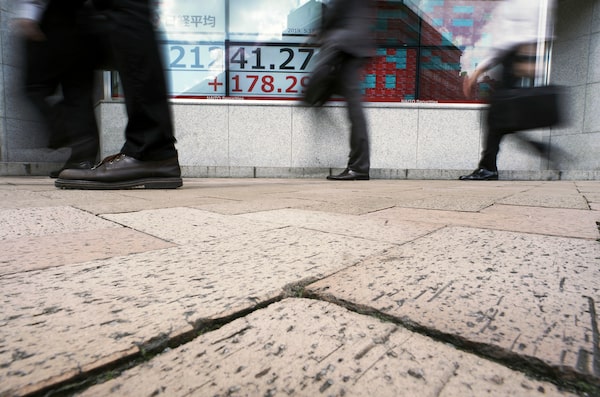
Since the White House added Huawei to a trade blacklist last week, several companies have suspended business with the world’s largest telecom equipment maker.Eugene Hoshiko/The Associated Press
U.S. stocks slid on Monday as the White House’s restrictions on Chinese telecoms equipment maker Huawei Technologies Co. Ltd weighed on the technology sector and raised concerns that the move would further inflame trade tensions between the United States and China.
Since the White House added Huawei to a trade blacklist last week, several companies have suspended business with the world’s largest telecom equipment maker. Alphabet Inc.’s Google has moved to stop providing Huawei with access to its proprietary apps and services, Reuters reported on Sunday. Mobile phone parts producer Lumentum Holdings Inc. also announced that it has discontinued shipments to Huawei.
Google said basic services would still function on the Android operating system used in Huawei’s smartphones. Google also said existing smartphone owners would not lose access to its Google Play app store or security features.
On Monday, the U.S. Commerce Department created a temporary general license restoring Huawei’s ability to maintain existing networks and provide software updates to existing Huawei handsets. The license, which lasts until Aug. 19, scales back the restrictions imposed last week.
But unless the U.S. Commerce Department grants exceptions, a ban announced last week on all purchases of U.S. technology would badly hurt Huawei, analysts say.
Washington claims Huawei poses a national security threat. Its placement on the Entity List by the Trump administration last week is widely seen as intended to persuade resistant U.S. allies in Europe to exclude Huawei equipment from their next-generation wireless networks, known as 5G.
“This is [a] major crisis for Huawei. Instead of being the world’s largest handset manufacturer this year, it will struggle to stay [at number] two, but probably fall behind,” analyst Roger Entner said, referring to its ranking in worldwide cellphone sales. “How competitive is a smartphone without the most well-known and popular apps?”
Other chipmakers, including Intel Corp., Qualcomm Inc., Xilinx Inc. and Broadcom Inc., will not supply the Chinese company until further notice, according to a Bloomberg report.
S&P 500 technology stocks dropped 1.75 per cent, the largest percentage decline among the benchmark index’s 11 major sectors. The Philadelphia Semiconductor Index, which includes Huawei suppliers Qualcomm, Broadcom and Micron Technology Inc., tumbled 4 per cent to hit its lowest level in more than two months.
Shares of Apple Inc. slumped 3.1 per cent, making them the biggest drag on Wall Street’s major indexes. The iPhone maker’s shares were also pressured after HSBC warned that higher prices for the company’s products after the latest increases in tariffs could have “dire consequences” on demand.
“The political risk now has become a business risk,” said Chad Morganlander, senior portfolio manager at Washington Crossing Advisors in Florham Park, N.J. “This could affect in a meaningful way earnings expectations for many tech names.”
The Dow Jones Industrial Average fell 84.1 points, or 0.33 per cent, to 25,679.9, the S&P 500 lost 19.3 points, or 0.67 per cent, to 2,840.23, and the Nasdaq Composite dropped 113.91 points, or 1.46 per cent, to 7,702.38.
After touching record highs at the beginning of May, Wall Street’s main indexes have succumbed to selling pressure on mounting concerns about a prolonged U.S.-China trade war. The S&P 500 is on track to post its worst monthly decline since the December sell-off, trading nearly 4 per cent below its all-time high.
“The further the trade war goes, the more escalation keeps happening,” said Matt Watson, portfolio manager at James Investment Research in Alpha, Ohio. “We’re not going in and trying to do a lot of buying at this point.”
Among gainers, shares of Sprint Corp. and T-Mobile US Inc. rose after Federal Communication Commission chairman Ajit Pai came out in favour of the merger of the two telecom companies. Sprint and T-Mobile pared gains, however, after Bloomberg reported that the U.S. Department of Justice was leaning against approving the deal.
Still, Sprint shares ended 12.5 per cent higher while T-Mobile shares rose 3.9 per cent.
Dish Network Corp. shares declined 5.9 per cent after the company said it would buy broadcast satellite service assets from EchoStar Corp. in an US$800-million deal, although the shares pared losses in afternoon trading.
Declining issues outnumbered advancing ones on the NYSE by a 2.03-to-1 ratio; on Nasdaq, a 1.81-to-1 ratio favoured decliners.
The S&P 500 posted 25 new 52-week highs and 11 new lows; the Nasdaq Composite recorded 35 new highs and 152 new lows.
Volume on U.S. exchanges was 6.4 billion shares, compared with the 7.01 billion average for the full session over the past 20 trading days.
Reuters with files from The Associated Press